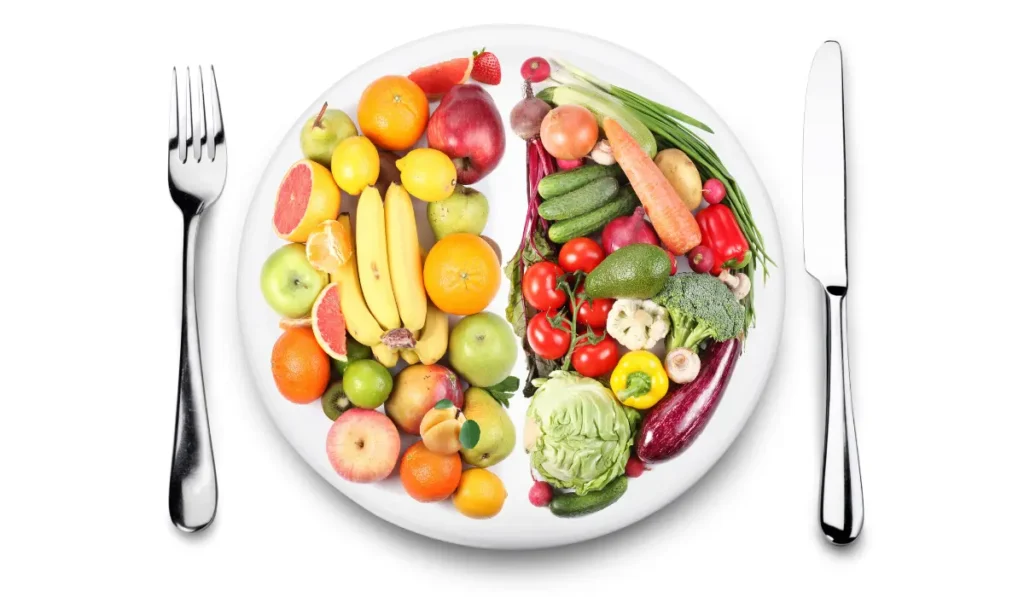Imagine a world where your diet fits your unique biology. This could lead to optimal health and well-being. Personalized nutrition is a new field that promises to change how we eat. I’ve struggled with health issues and seen how tailored nutrition can change lives.
Chronic diseases like heart disease and diabetes are big health problems. They often come from bad eating habits. But, what if you could prevent them by using your genetic makeup and metabolism? Personalized nutrition uses science to give you diet plans that are just right for you.

Personalized nutrition helps you understand how your body reacts to food. It lets you make choices that are best for you. This could mean eating foods that fight inflammation or adding superfoods to your diet. It’s all about improving your health and changing your life for the better.
The Importance of Personalized Nutrition
In the United States, chronic diseases are a big problem. About 60% of adults have one or more chronic conditions. These conditions often come from diet, but standard diets don’t work well.
Personalized nutrition says we’re all different. Our genes, gut, and how we metabolize food vary. Age, gender, how active we are, and our environment also matter. By focusing on these differences, personalized nutrition aims to help us eat better and prevent chronic diseases.
Factors Contributing to the Need for Personalized Nutrition
Our bodies are complex, and a personalized diet is key for good health. Here are reasons why we need a more tailored approach to nutrition:
- Genetic variations: Our genes affect how we process food. This means we can react differently to the same foods, even if we have the same DNA.
- Gut microbiome: Our gut microbiome is vital for vitamin production, immune health, and more. Changes in it are linked to diseases like IBD, Type-2 diabetes, heart disease, and obesity.
- Metabolic profiles: Some people don’t handle carbs or fats well. This increases their risk of metabolic diseases. So, we need precision nutrition and nutrigenomics.
- Environmental factors: Our age, gender, activity level, and environment also affect how we react to food.
By understanding these differences and customizing diets, personalized nutrition can greatly improve health and prevent chronic diseases.
“A healthy diet rich in fruits, vegetables, whole grains, legumes, and nuts is associated with lower levels of chronic diseases in various adult subgroups.”
Understanding the Role of the Microbiome
The gut microbiome is a community of trillions of microorganisms in your digestive tract. It’s key to your health and how your body reacts to food. This ecosystem helps make vitamins, boosts your immune system, and breaks down nutrients. Problems in the gut microbiome can lead to diseases like inflammatory bowel disease and obesity.
Personalized nutrition focuses on improving your gut microbiome. It uses prebiotics, probiotics, and other foods to help. By knowing your gut’s unique makeup, you can eat to support good bacteria. This way, you can improve your gut health and overall health.
“The gut microbiome is a dynamic and diverse ecosystem that can profoundly influence our health and well-being. Understanding its intricate role is crucial for personalized nutrition strategies that can transform our lives.”
Many studies show how important the gut microbiome is for health. For example, research by Huttenhower et al. (2012) in Nature explored a healthy human microbiome. Cho and Blaser (2012) in Nature Reviews Genetics looked at how it affects health and disease.
Starting your personalized nutrition journey means understanding your gut microbiome. By balancing your microbial community, you can unlock the best nutrition for you. This can greatly improve your health and wellbeing.
Personalized Nutrition and Genetics
Your genetic makeup is key to how your body reacts to different foods and nutrients. Nutrigenomics and nutrigenetics study the link between genes, diet, and health. They show that genetic differences can greatly affect how your body uses nutrients and vitamins.
For example, some people may be more likely to develop insulin resistance based on their genes. Personalized nutrition uses this info to give you a diet plan that fits your genetic profile. This helps improve your metabolic health and overall well-being.
The Impact of Individual Genetics on Food Metabolism
Your genes influence how your body processes nutrients. Here are some ways genetic testing can guide a personalized diet:
- Those with certain FTO gene variants might gain weight easier and need a diet low in calories but high in protein.
- Genetic profiles related to omega-3 and omega-6 fatty acids can show who benefits most from these supplements.
- Genetic differences in the TCF7L2 gene can affect how carbs are processed, impacting blood sugar levels.
Knowing your genetic makeup helps you create a personalized nutrition plan. This plan is tailored to your metabolic needs, supporting your health and well-being.
“Personalized nutrition is not just about what you eat, but how your body responds to it. By leveraging the power of genetics, we can create a diet tailored to your individual needs.”
Clinical Applications of Personalized Nutrition
Personalized nutrition is making a big impact in healthcare. It helps manage food allergies, intolerances, and sensitivities. By removing trigger foods, elimination diets can ease symptoms and improve health.
An allergen-free diet can help people with celiac disease, lactose intolerance, or nut allergies. It’s also being used to treat other chronic conditions. Custom therapeutic diets may reduce symptoms and improve health outcomes.
“Personalized nutrition has changed how we handle food-related health issues. It addresses individual needs and sensitivities. This way, we can create personalized diets that not only ease symptoms but also support long-term health.”
A study with 347 participants showed personalized diets can lower triglycerides. The diet also improved body weight, waist size, HbA1c, diet quality, and gut health in those who followed it well.
This study shows personalized nutrition’s potential in tackling many food sensitivities and chronic conditions. By using genetic and metabolic data, doctors can craft personalized diet plans. These plans aim to enhance patient results.
The Omics Sciences and Personalized Nutrition
The “omics” sciences, like nutritional genomics, metabolomics, proteomics, and microbiomics, are key to personalized nutrition. They study genes, metabolites, proteins, and microbes to understand each person’s unique biology. This way, personalized nutrition can find out what foods are best for each person.
Leveraging Nutritional Genomics, Metabolomics, and Other Omics Sciences
This method looks at how genes, environment, and lifestyle affect health. Nutritional genomics checks how genes react to food. Metabolomics looks at how our bodies use nutrients and how it affects disease risk. Using these sciences, personalized nutrition can give advice that’s just right for each person.
- Nutritional genomics: Analyzes how an individual’s genetic makeup affects their response to dietary components.
- Metabolomics: Examines the unique metabolic profiles that influence nutrient utilization and disease risk.
- Proteomics: Studies the complex interplay of proteins and their role in health and disease.
- Microbiomics: Explores the diverse microbial communities within the human body and their impact on overall health.
By combining these “omics” sciences, personalized nutrition can lead to better health advice. This could help prevent diseases and improve overall health.
“Omics technologies, including genomics, proteomics, and metabolomics, are popular in personalized nutrition research for studying inter-individual responses to various diets.”
Personalized Nutrition Recommendations
Today, we don’t follow the same diet plans as everyone else. Personalized nutrition is all about you. It looks at your genes, gut health, and how your body reacts to food. This way, you get a diet that’s just right for you.
At the core of personalized nutrition are nutrient-dense, anti-inflammatory foods. These foods are packed with goodness and help your gut stay healthy. They also fight inflammation and boost your overall health. Your diet might include special foods to help your gut or adjust the types of food you eat.
- Personalized diet plans go beyond generic recommendations, considering your individual needs and preferences.
- Nutrient-dense, anti-inflammatory foods are prioritized to support overall health and well-being.
- Specific gut-friendly foods, such as prebiotics and probiotics, may be recommended to optimize your gut microbiome.
The aim of personalized nutrition is to give you a diet that fits your unique body and life. This approach helps you reach your health goals and live your best life.

“Personalized nutrition is not just about what you eat, but how your body responds to it. By understanding your individual needs, we can create a diet that truly nourishes you from the inside out.”
Challenges in Implementing Personalized Nutrition
Personalized nutrition offers great benefits, but it faces several hurdles. The “omics” sciences, like genomics and metabolomics, create a lot of data. Experts must deal with complex bioinformatics and make sure research is reliable.
It’s also key to teach healthcare professionals about personalized nutrition. This includes doctors and nutrition education for dietitians. Keeping up with new research in this field is hard. Healthcare providers need to know how to use this knowledge well.
There are also big ethical considerations and data privacy issues. People might not want to share personal data. So, strict rules are needed to protect privacy and prevent misuse.
Overcoming Challenges in Personalized Nutrition
To tackle these issues, we need a broad strategy. Improving bioinformatics and data analysis can help manage the data flood. Also, training healthcare providers in nutrition education is vital.
Creating strong ethical guidelines and data privacy policies is also crucial. This will help build trust and calm consumer fears. By solving these problems, personalized nutrition can reach its full potential. This will lead to better health and a more personalized approach to well-being.
“The future of personalized nutrition lies in the intersection of cutting-edge science, innovative technology, and thoughtful ethical considerations.”
The Future of Personalized Nutrition
Personalized nutrition is growing fast and could change healthcare a lot. It uses new science and tech to help people eat better. This could help prevent and manage chronic diseases by giving each person the right diet.
Soon, we might see home tests and smart devices helping people eat better. 46.5% of dietitians already use personalized nutrition every day. 42.72% have made nutrition plans based on advanced data.
Understanding our genes and gut microbes is key to better diets. Genetic studies on gut microbes and diet are important. They show how our gut affects our health and weight.
“The future of personalized nutrition may involve the widespread use of home-testing kits, smart devices, and AI-powered platforms to deliver customized nutritional guidance to individuals, empowering them to take a more proactive approach to their health.”
Companies like Roots Food Group are leading this change. They offer diets that fit each person’s needs for better health. They work with chefs and dietitians to make tasty, healthy meals.
Looking ahead, personalized nutrition will use new tech and science. This will help people stay healthy and avoid chronic diseases. It’s a big step towards better health for everyone.

Conclusion
Personalized nutrition is changing how we think about health and wellness. It goes beyond the old one-size-fits-all approach. It uses the “omics” sciences to give you a diet plan that fits your unique genetic, metabolic, and gut health.
This approach could greatly improve how we prevent and manage chronic diseases. It lets you make better choices about what you eat. This can lead to better health and well-being for everyone.
As personalized nutrition grows, it promises a future where we all play a big role in our health. It could cut the risk of diseases like diabetes and obesity by more than half. It also helps fight childhood obesity.
With a diet plan made just for you, you can start on a path to better health. This is a chance to improve your overall health and well-being.
Embracing personalized nutrition means looking at your health in a new way. It considers your genes, lifestyle, and environment. It uses the latest “omics” science to give you the tools to make smart choices about your diet and lifestyle.
This way, you can take control of your health and wellness journey. It’s a powerful way to empower yourself to make positive changes in your life.
FAQ
What is personalized nutrition?
Personalized nutrition is a new science. It aims to give dietary advice based on your genetics, metabolism, and gut health. This could change how we prevent and treat diseases.
Why is personalized nutrition important?
It’s important because we all react differently to food. Our genes, gut health, and metabolism affect how we process food. Personalized nutrition helps us get the most health benefits from what we eat and fight chronic diseases.
How does the gut microbiome affect personalized nutrition?
The gut microbiome is key to our health and how we respond to food. It affects our overall well-being. Personalized nutrition can help balance our gut health through specific diets.
How do genetics impact personalized nutrition?
Our genes influence how we use nutrients and food. Nutrigenomics and nutrigenetics show how genetic differences affect our metabolism. This leads to diets tailored to our genetic makeup.
What are the clinical applications of personalized nutrition?
It’s used in managing food allergies and intolerances. Personalized diets can help alleviate symptoms. It’s also being explored for other chronic conditions to improve health outcomes.
How do the “omics” sciences contribute to personalized nutrition?
The “omics” sciences are crucial. They study molecules to understand our unique biology. This helps create personalized diets based on our individual profiles.
What are the key features of personalized nutrition recommendations?
Personalized nutrition goes beyond general diets. It considers your genetics, gut health, and metabolism. It might suggest specific foods or supplements to improve your health.
What are the challenges in implementing personalized nutrition?
Challenges include handling large amounts of data and educating healthcare professionals. There are also ethical and legal issues with using personal data and genetic information.
What is the future of personalized nutrition?
The future looks promising. Advances in the “omics” sciences and data analysis will make personalized nutrition a key part of healthcare. It will empower people to take charge of their health.